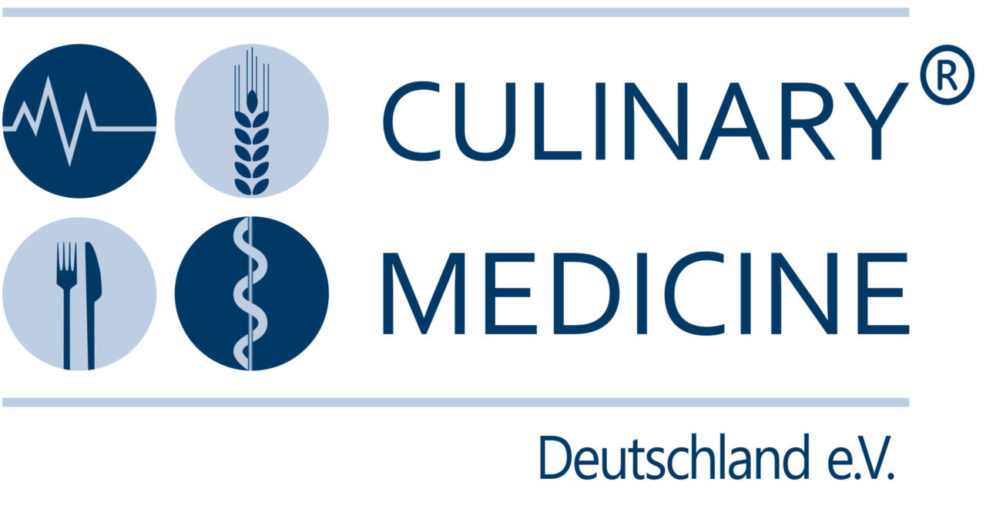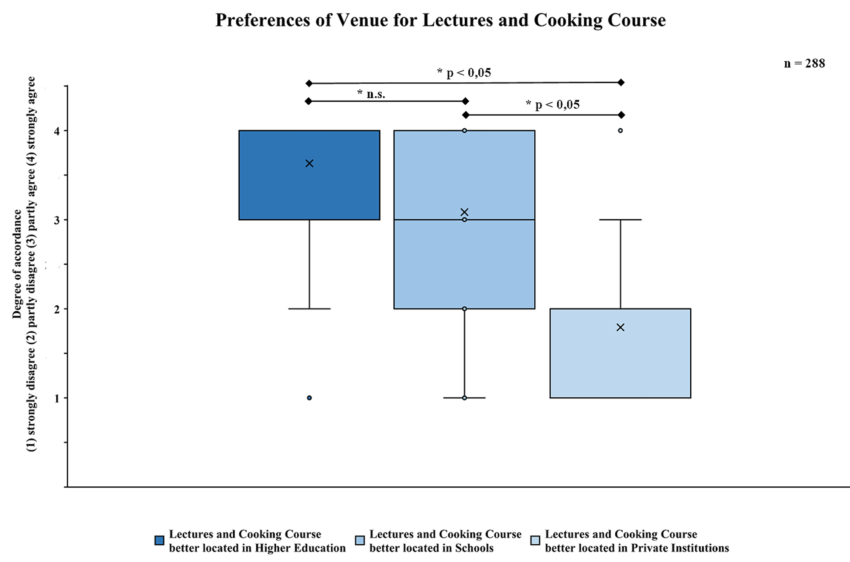Culinary Medicine - multicentre evaluation launched at the universities of Brandenburg, Gießen and Göttingen
Following successful development and piloting at the University Medical Centre Göttingen https://s.gwdg.de/lwjtoh, two further universities, the Brandenburg Medical School Theodor Fontane and the University Medical Centre of the Justus Liebig University Giessen, have started teaching the innovative elective Culinary Medicine at the beginning of the summer semester 2021. Culinary Medicine translates current nutritional medical findings into the living environments of patients and improves medical counselling competence in nutrition-associated diseases. The teaching format is an indication-based cooking course (Teaching Kitchen) based on the evidence-based guideline Nutrition Therapy in Clinic and Practice (LEKuP) (Hauner et al. 2019 https://www.dgem.de/pressemitteilungs-archiv-122019 ). The LEKuP covers all important nutritional indications https://s.gwdg.de/1rb0ZG
The goals of this cooperation are, on the one hand, to strengthen the importance of nutritional medicine already in medical studies. 70-80 percent of all diseases have a nutritional cause, a nutritional background or a nutritional therapeutic consequence. The consequences of malnutrition, overnutrition or nutritional deficiencies are numerous diseases such as obesity, diabetes mellitus, lipometabolic disorders, coronary heart disease, cancer, cachexia and hormonal disorders. (Memorandum of the Federal Association of German Nutrition Physicians e.V. (BDEM), the German Society for Nutritional Medicine e.V. (DGEM) and the German Academy of Nutritional Medicine e.V. (DAEM) of 30.03.2021 see below). Despite the great importance of better nutritional medical care, nutritional medicine content is underrepresented in medical studies at German universities. The knowledge taught so far during medical studies is not sufficient to guarantee adequate training in nutritional medicine for doctors at the latest scientific level (Memorandum of BDEM, DGEM & DAEM of 30.03.2021(https://www.thelancet.com/journals/lanplh/home and https://s.gwdg.de/ETymXx).
The new elective Culinary Medicine makes an important first contribution to improving the situation for medical students. In 28 course hours, clinical indications based on the evidence-based LEKuP and a practical nutrition therapy derived from it are synergistically brought together. Appropriate case studies complement the teaching.
Zum anderen wird durch die multizentrische Evaluation die Wirksamkeit des Lehrangebotes Culinary Medicine im Hinblick auf die Beratungskompetenz bei ernährungs- und lebensstilabhängigen Erkrankungen im Detail erforscht. Dabei geht es auch um die Sensibilisierung der Medizinstudierenden für einen gesunden und nachhaltigen Lebensstil im Sinne einer Planetary Health (Eat Lancet 2019 https://s.gwdg.de/oC3x9Y) sowie um eine Verbesserung der Kooperation mit anderen Ernährungsfachberufen. Daraus abgeleitete Fragestellungen sollen durch Promotionen an allen teilnehmenden Hochschulen untersucht werden.
Until November 2020, the elective subject Culinary Medicine at Göttingen University Medical School was taught with a hygiene concept in presence. Due to the pandemic, the teaching concept was reworked for digital implementation and has been taught exclusively digitally since December 2020. The students are connected to the lecturers in the teaching kitchen via video conferencing software and interactively cook the previously selected recipes in their own kitchen. Both nutritional-physiological and practical-culinary aspects are continuously discussed. The programme starts with a short introductory presentation on the clinical frame of reference.
"We are clearly positively surprised at how well Culinary Medicine can also be taught digitally," says PD Dr. med. Thomas Ellrott, who heads the project at the University Medical Centre Göttingen. "However, we have also noticed that the interactivity between teachers and students decreases significantly when there are more than about 12 students in the online format," Ellrott explains further.
Durch die weiterhin angespannte Pandemiesituation erfolgt die multizentrische Evaluation im Sommersemester 2021 an allen drei Hochschulstandorten ebenfalls in komplett digitaler Lehre. Dabei verwenden alle Institutionen die gleichen Kursmaterialien, führen den Kurs in gleicher Form durch (7 Kurstage à 4 Lehrveranstaltungsstunden) und nutzen auch den gleichen eigens programmierten LIME-Survey zur Evaluation, damit die erhobenen Daten gemeinsam ausgewertet und veröffentlicht werden können. „Die ausgezeichnete Zusammenarbeit der Universitäten auf diesem innovativen Gebiet ist Teil des beabsichtigten Co-Creation-Prozesses“, kommentiert Uwe Neumann, Vorstandsvorsitzender von Culinary Medicine Deutschland e.V. (vormals CookUOS e.V.), „und wir würden uns freuen, wenn sich noch weitere interessierte Hochschulen anschließen.“
Das Modellprojekt Culinary Medicine des Instituts für Ernährungspsychologie an der Georg-August-Universität Göttingen/Universitätsmedizin und von Culinary Medicine Deutschland e.V. (vormals CookUOS e.V. ) wird seit Dezember 2019 von der Rut- und Klaus-Bahlsen-Stiftung (Hannover) gefördert. Nach der Evaluation werden alle Lehrmaterialien als Open Access veröffentlicht.

